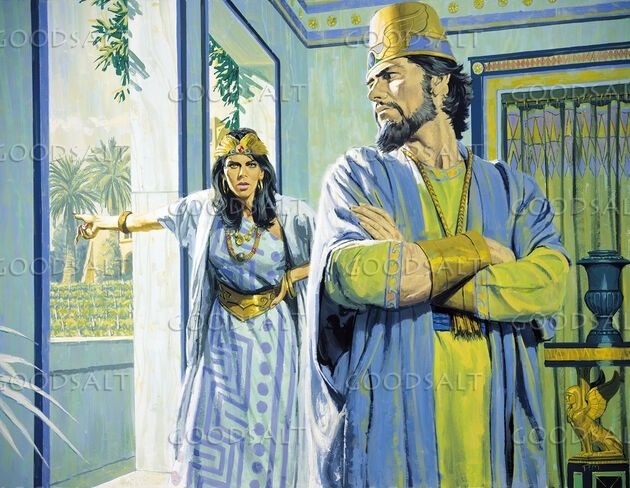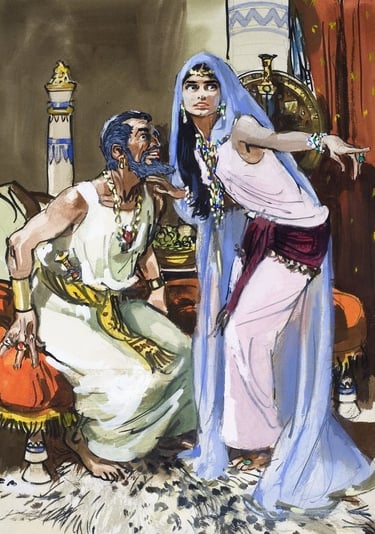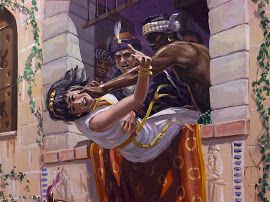

JEZEBEL: History’s OG Villainess or Just a Woman Who Wouldn't Play Nice?
When someone calls a woman a "Jezebel," you already know it’s not a compliment. The name conjures up images of a sultry seductress in red, batting her lashes while plotting murder. But like most historical smear campaigns, the story of Jezebel deserves a fresh, and slightly exasperated re-examination. Let’s go back—way back—to the 9th century BC and find out: who was Jezebel, really?
Jezebel was a (Lebanese) Phoenician princess. Translation: homegirl had royal blood, and probably a way better skincare routine than her dusty in-laws in Israel. She was married off to King Ahab, who historians and scripture alike agree was… underwhelming. You read that right, the dude was boring and a pussy. Think of him as that one guy at work who says, “I’ll check with my wife” before making any decision, including what to eat for lunch.
She had her own set of beliefs and worshipped Baal, which was public knowledge before Ahab married her. A little fact many historians like to omit. Anyways, Baal was/is the Phoenician god of rain, fertility, and good harvests. Seems reasonable, right? I mean, her deity brought crops and prosperity. Yahweh, on the other hand, was often sending plagues, flooding things, and smiting people for blinking incorrectly. But when Jezebel actively promoted Baal worship in Israel, that was when the torches and pitchforks came out.
Let’s Talk Baal Worship
Baal was a big deal in Phoenicia. A storm god with the power to bring life-sustaining rain in a desert climate? That’s like owning a Starbucks franchise in a college town. No wonder she was loyal. But her attempt to replace Yahweh with Baal in Israel didn’t exactly sit well with the prophets of Yahweh. Spoiler: it led to one of the most aggressively messy prophet-persecution campaigns of all time.
She had many of Yahweh’s prophets killed, and she really had it out for Elijah. To be fair, Elijah was a loud, dramatic desert guy with a flair for miracles and public roast sessions. Jezebel hated him enough to order his assassination, and he hated her enough to publicly predict her death-by-defenestration (more on that later).
Naboth's Vineyard: The Original Eminent Domain Scandal
Now for the story of Naboth’s neighboring vineyard. King Ahab wanted it. Naboth said no. So Ahab sulked like a toddler, and Jezebel basically said, “Oh my gods, I’ll handle it.” She forged some letters, accused Naboth of blasphemy, and had him stoned to death. Boom, done.
Cold? Yes. Smart? Also yes. Evil? Sure, but let’s not act like this was unusual behavior for royals at the time. The ancient world didn’t exactly run on democracy and HR policies.
The End (And the Makeup Scene)
Here’s the cinematic part everyone loves to quote: Jezebel, knowing she’s about to die, takes time to do her hair and makeup. You have to respect the commitment. If you’re going out, go out fabulous. Her servants throw her out the window (loyalty was clearly not her love language), she gets trampled by horses, and dogs eat her body. It's gory, symbolic, and the stuff of ancient horror-core legend.
Reputation: Slut-Shamed by History
Here's where it gets spicy: despite everything Jezebel actually did (which was plenty), there is zero biblical evidence of her being promiscuous. None. Zilch. Nada. Yet over the centuries, her name became synonymous with “temptress,” “loose woman,” and “hussy.” She’s been reduced from powerful queen to sexy Halloween costume. Why? Because she was too powerful. She dared to control, to scheme, to rule. That’s the kind of behavior patriarchy loves to slap a scarlet letter on.
The figure of Jezebel has long been portrayed as a symbol of immorality and moral decay. Though she is indeed recorded as a ruthless and ambitious queen who persecuted those opposing her, including the prophets of Yahweh, the characterization of Jezebel as a drunkard or a prostitute lacks historical substantiation and reflects broader societal biases that pervade interpretations of her story. Examining the motivations behind the embellishments of her narrative and advocating for a more nuanced understanding of this biblical figure. Will be based on factual evidence rather than sensationalized rhetoric.
Firstly, it is crucial to understand the historical context in which Jezebel lived. As a Phoenician princess married to King Ahab of Israel, her role as queen was not only politically significant but also emblematic of a cultural collision between Israelite monotheism and Canaanite polytheism. Jezebel actively promoted the worship of Baal, which brought her into direct conflict with the prophets of Yahweh. This opposition framed her as an antagonist in the biblical narrative, leading to her vilification from the offset. So stopping right here; It's pretty safe to assume that this was her only crime at this point in time. The Israelite citizens barely knew her but didn't like her because she didn't worship their God. Alrighty then, moving right along... The added depiction of Jezebel as promiscuous or libertine stems largely from patriarchal interpretations of her actions and influence. Such characterizations serve to reinforce certain moral dichotomies prevalent in society, painting female ambition and power in a negative light.
Furthermore, the historical portrayal of Jezebel has been consistently shaped by the perspectives of those who chronicled her story. Many biblical texts reflect the cultural norms and values of their authors rather than objective truths, duh. The writings regarding Jezebel have often been subject to the whims of religious ideologies that aim to uphold specific moral teachings. Consequently, her legacy has been marred by hyperbole and misinformation, leading contemporary historians and theologians to question the veracity of the accounts that portray her as licentious.
One persuasive argument for the mischaracterization of figures like Jezebel can be attributed to the intersection of gender and morality in historical narratives. Male chroniclers, often driven by religious zealotry, have historically demonized powerful women who wielded influence contrary to traditional roles. By labeling Jezebel a prostitute or equating her with debauchery, these narratives diminish the legitimacy of her power. Such distortions not only do a disservice to the integrity of historical scholarship but also perpetuate harmful stereotypes about women in leadership positions across cultures and eras.
As such, it becomes essential for modern scholars and readers alike to critically engage with biblical texts and historical accounts. This entails not just accepting quoted scriptures at face value but conducting thorough research to disentangle fact from fiction. The Biblical canon, with its compilation of diverse authors and audiences, is undeniably rife with exaggerations, biases, and misrepresentations. Therefore, when exploring characters like Jezebel, it is imperative to approach these narratives through an analytical lens that recognizes the historical contexts and the authors’ intentions.
Again, the portrayal of Jezebel as a wanton woman who indulged in vice is an oversimplified and misleading representation of a complex historical figure. Rather than succumbing to sensationalism, it is our responsibility as scholars and informed individuals to scrutinize the narratives we inherit, to seek out the truth amidst the fabrications, and to challenge the status quo of historical interpretation. Engaging critically with the past not only enriches our understanding of figures like Jezebel but also empowers us to think for ourselves amid the cacophony of opinions that shape our cultural consciousness.
So, is she the evil villainess she's made out to be? Or just a capable woman stuck in a theocratic frat house of weak men and angry prophets? Let’s not forget she was a foreigner, a woman, and a religious dissenter—basically the holy trifecta of ancient Israelite disapproval. Oh, and she didn't play second fiddle. That alone was enough to write her out of the "strong female lead" category and dump her straight into the "demonic woman" bin.
Modern Reflections: Lebanon Still Isn’t Easy
Today, the region Jezebel came from—modern-day Lebanon—is still battling chaos, political instability, and social fragmentation. Put it this way: the Middle East won't ever change as it has always been riddled with havoc. More proof on this very statement follows blog below by way of factual occurrences backed by actual events located here.
Was Jezebel evil? Absolutely. But so were most people in power back then. Did she murder and manipulate? Yes. Was she any worse than, say, King David, who literally had a man killed to cover up his affair? Not really.
What she was, unapologetically, was a woman who refused to bow, scrape, or stay in her lane. And for that, she was dragged—literally and historically. But if you ask me, she didn’t fall from grace. She was pushed.
But as bad as Jezebel was, many scholars will argue that she pales in comparison to her own daughter, Athaliah! Jezebel’s name gets thrown around as the epitome of an "evil woman" but we shouldn't be so quick to jump on that bandwagon. Though because of the aforementioned manipulative influence over King Ahab, her persecution of the prophets, and her idolatrous practices, Jezebel’s name (understandably) has become a byword for female wickedness. Yet, as fearsome and destructive as Jezebel was, many biblical scholars and theologians argue that her daughter, Athaliah, was even worse. Jezebel may have wielded power through her husband, but Athaliah took it for herself—ruthlessly and unapologetically.
Athaliah, the daughter of Ahab and Jezebel, was the only woman in the Bible to rule over Judah, a position she seized through bloodshed and maintained through terror. Her reign began with a massacre. Upon the death of her son Ahaziah, Athaliah did not mourn; she mobilized. She ordered the murder of the entire royal family—her own grandchildren included—so that she could claim the throne. While Jezebel’s sins were many, she never sought the throne for herself. Athaliah, on the other hand, orchestrated a coup, usurped the Davidic line, and ruled for six years with an iron fist (2 Kings 11:1-3).
Her rule marked one of the darkest chapters in the history of Judah. She reintroduced Baal worship, just like her mother, but unlike Jezebel—who was a Phoenician queen married into Israel—Athaliah was Judah’s own. Her corruption came from within the covenant community, not from a foreign alliance. That betrayal cut deeper. She not only brought idolatry into the heart of Judah but threatened to extinguish the Messianic lineage altogether.
The most chilling aspect of Athaliah’s legacy may be the way she weaponized maternal power. Jezebel was a queen and a mother, yes, but Athaliah took motherhood and turned it inside out. Instead of nurturing her offspring, she tried to annihilate them. The very ones she should have protected became threats to her authority. In this way, she transcended her mother’s wickedness—not only by replicating Jezebel’s sins but by committing them against her own bloodline.
In the end, Athaliah’s reign was undone by divine providence. A single grandson, Joash, was hidden from her wrath and eventually restored to the throne in a dramatic coup orchestrated by the high priest Jehoiada. Her execution marked a return to covenant faithfulness in Judah, but her legacy lingered as a chilling reminder of power unmoored from righteousness.
In comparing Jezebel and Athaliah, we confront two archetypes of destructive female power. Jezebel operated through influence; Athaliah seized control outright. Jezebel sought to corrupt religion; Athaliah attempted to destroy a nation’s future. One could argue that Athaliah was Jezebel’s ultimate ambition realized: a queen in her own right, with no king to answer to—and no mercy to show!




The Middle East has seen thousands of years of history—rich cultures, innovation, trade—but also, unfortunately, a long list of wars, invasions, occupations, and humanitarian crises. Lebanon in particular, though a small country, has played a huge role in regional history and has faced its share of both glory and suffering. Let’s break this down, starting with the conditions in the region and then tracing Lebanon’s major historical events from ancient times (including the biblical reference to Jezebel) to today.
🌍 How Horrible Are the Conditions in the Middle East?
Wars and conflict: Civil wars (like in Syria or Yemen), proxy wars (Iran vs. Saudi Arabia), and foreign interventions (U.S. in Iraq, Russia in Syria).
Authoritarian regimes: Many countries are ruled by oppressive governments that crack down on free speech and political opposition.
Economic instability: Oil wealth hasn't translated to prosperity for all. In places like Lebanon, inflation and unemployment are crushing.
Religious & sectarian tension: Sunni vs. Shia, Muslim vs. Christian, and other divisions have led to frequent clashes and discrimination.
Refugee crises: Millions of people are displaced due to violence and instability—some fleeing countries like Syria and Iraq to others like Lebanon and Jordan.
Corruption and mismanagement: Public funds are often stolen or wasted, leaving basic infrastructure like electricity and healthcare in shambles.
So yes—conditions in many parts of the Middle East have been and still are extremely difficult for millions of people.
To further explain WHY I made such a statement about Lebanon's past, please feast your eyes on all these FACTS! Here's a Lebanese timeline– From Jezebel to Today:
📜 Ancient Times – Jezebel and the Phoenicians
Jezebel (9th century BCE): Jezebel was a Phoenician princess from Sidon (modern Lebanon), married to Ahab, king of Israel. She promoted Baal worship, clashed with the prophet Elijah, and was ultimately killed—thrown from a window and eaten by dogs, according to the Bible.
Phoenician era: Lebanon's coast was home to the Phoenicians, legendary seafarers who founded cities like Tyre and Sidon and spread their alphabet and culture across the Mediterranean.
🏛️ Roman & Byzantine Periods
Cities like Baalbek became major Roman centers.
Christianity spread through the region.
⚔️ Islamic Conquests (7th century)
Lebanon fell under Muslim control.
The mountains became a refuge for Christian Maronites and later for Druze communities.
🏰 Crusades (11th–13th centuries)
Lebanon was caught between Crusader states and Muslim armies. Fortresses and battles left a lasting imprint.
🧿 Ottoman Rule (1516–1918)
Lebanon was part of the Ottoman Empire.
Tensions between religious groups (Maronites, Druze, Muslims) occasionally exploded into violence.
🎌 French Mandate (1920–1943)
After WWI, Lebanon was carved out of Greater Syria and placed under French control.
The country gained independence in 1943, with a power-sharing agreement between Christians and Muslims.
🏙️ Civil War (1975–1990)
A brutal, 15-year conflict fueled by sectarian tensions, Palestinian militancy, Israeli and Syrian interventions.
Over 100,000 people killed, and Beirut became a war-torn city.
Israeli Invasions (1978 & 1982)Israel invaded southern Lebanon to fight the PLO and later Hezbollah.
The 1982 invasion led to the Sabra and Shatila massacre.
🪖 Syrian Occupation (1976–2005)
Syria maintained tight control over Lebanon after the civil war.
Ended after the 2005 Cedar Revolution, sparked by the assassination of Prime Minister Rafik Hariri.
💥 2006 War with Israel
Hezbollah and Israel fought a month-long war.
Lebanon suffered heavy civilian casualties and infrastructure damage.
📉 Economic Collapse (2019–Present)
Lebanon’s economy collapsed due to corruption, mismanagement, and political paralysis.
Banks froze people’s savings. The currency lost over 90% of its value.
Widespread poverty, unemployment, and a total lack of basic services.
🔥 Beirut Port Explosion (August 4, 2020)
One of the largest non-nuclear explosions in history.
Caused by poorly stored ammonium nitrate. Over 200 killed, thousands injured.
A symbol of Lebanon’s failed leadership and decaying institutions.
